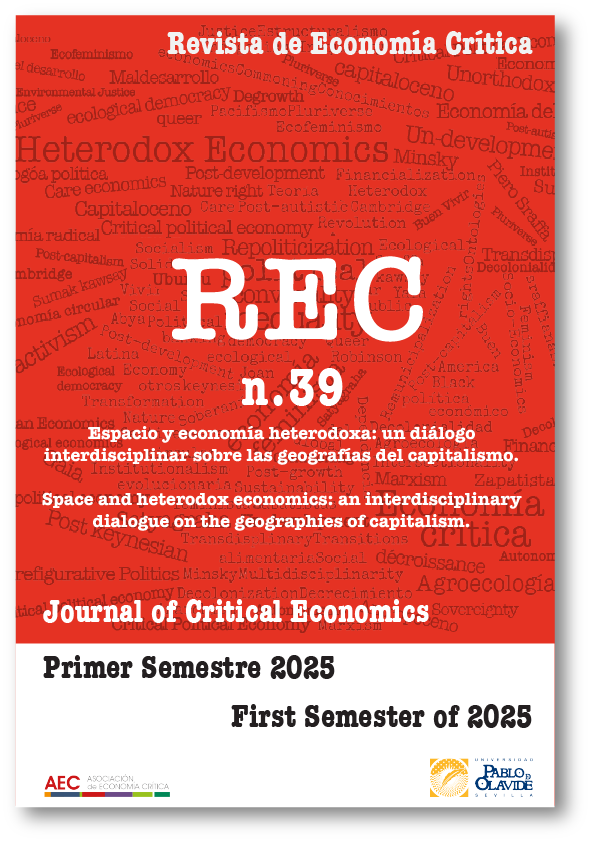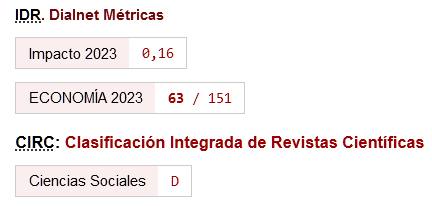La ilusión de la conservación
por qué amar la naturaleza no es suficiente
DOI:
https://doi.org/10.46661/rec.11732Palabras clave:
Alienación ambiental, Culto a lo silvestre, Ecologismo de los pobres, Half-Earth vs Whole-Earth, DecrecimientoResumen
Este estudio investiga cómo la percepción del medio ambiente como prioridad en la Unión Europea se relaciona con las preferencias hacia políticas del Pacto Verde Europeo, específicamente entre la protección de la biodiversidad y la reducción del consumo energético. Utilizando datos del Eurobarómetro 96.3 (2022) y aplicando análisis de tablas de contingencia junto con modelos de regresión logística, la investigación revela que quienes consideran el medio ambiente un problema crucial tienden a favorecer fuertemente la conservación de la biodiversidad, mientras que la reducción del consumo energético resulta marginal.
Los análisis estadísticos muestran que los sectores con mayor estabilidad económica y nivel educativo tienen más probabilidades de priorizar la biodiversidad, en contraste con aquellos que enfrentan dificultades económicas, quienes muestran menos predisposición a considerar el medio ambiente como un tema clave. Esta divergencia se interpreta como la “Paradoja Verde Europea”: una situación en la que la preocupación ambiental se orienta principalmente hacia la conservación de espacios naturales, sin cuestionar los patrones de consumo y producción que subyacen a la crisis ecológica.
El artículo también sitúa estos hallazgos en el contexto de debates teóricos sobre el “culto a lo silvestre” y el “ecologismo de los pobres”, destacando cómo la lógica conservacionista dominante refuerza una alienación ambiental y una división de clase en las representaciones y prioridades ecológicas. En definitiva, se plantea la necesidad de repensar el enfoque de las políticas ambientales para integrar de manera más efectiva la justicia social y transformaciones estructurales que apunten a una reducción real del metabolismo económico.
Descargas
Citas
Adams, W. M. (1996): Future nature: a vision for conservation. Earthscan Publications Ltd.
Brockington, D., Duffy, R., y Igoe, J. (2008): Nature unbound: Conservation, capitalism and the future of protected areas. Earthscan.
Brockington, D., Igoe, J. y Neves, K. (2010): "Casino conservation: Biodiversity and primitive accumulation in neoliberal Africa", Human Geography, 3(1), 49-59.
Büscher, B., Fletcher, R., y Brockington, D. (2017): "Half-Earth or Whole Earth? Radical ideas for conservation, and their implications", Oryx, 51(3), 407-410. https://doi.org/10.1017/S0030605316001228
Büscher, B., Sullivan, S., Neves, K., Igoe, J. y Brockington, D. (2012): "Towards a synthesized critique of neoliberal biodiversity conservation", Capitalism Nature Socialism, 23(2), 4-30. https://doi.org/10.1080/10455752.2012.674149
Dunlap, R. E., Van Liere, K. D., Mertig, A. G. y Jones, R. E. (2000): "New trends in measuring environmental attitudes: measuring endorsement of the new ecological paradigm: a revised NEP scale", Journal of Social Issues, 56(3), 425-442. https://doi.org/10.1111/0022-4537.00176
García, E. (2004): Medio ambiente y sociedad: la civilización industrial y los límites del planeta. Alianza Editorial.
García, E., & Cabrejas, M. (1997): València, l'albufera, l'horta: medi ambient i conflicte social. Universitat de València.
Guha, R., y Martínez-Alier, J. (1997): Varieties of environmentalism: essays North and South. Earthscan.
Hulton, G., Adams, W. M., & Murumbedzi, J. C. (2005): "Biodiversity conservation and the eradication of poverty", Science, 306(5699), 1146-1149. https://doi.org/10.1126/science.1097920
Igoe, J. (2013): "Nature on the move II: Contemplation becomes speculation", New Proposals: Journal of Marxism and Interdisciplinary Inquiry, 6(1-2), 37-49.
Igoe, J. (2018): The nature of spectacle: On images, money, and conserving capitalism. University of Arizona Press. https://doi.org/10.2307/j.ctt1qqhfzd
Inglehart, R. (1977): The silent revolution: Changing values and political styles among Western publics. Princeton University Press.
Inglehart, R. (1995): "Public support for environmental protection: Objective problems and subjective values in 43 societies", PS: Political Science & Politics, 28(1), 57-72. https://doi.org/10.2307/420583
Kulin, J., Johansson Sevä, I. y Dunlap, R. E. (2021): "Nationalist ideology, rightwing populism, and public views about climate change in Europe", Environmental Politics, 30(7), 1111-1134. https://doi.org/10.1080/09644016.2021.1898879
Martínez-Alier, J. (2002): The environmentalism of the poor: a study of ecological conflicts and valuation. Edward Elgar Publishing. https://doi.org/10.4337/9781843765486
Mbaria, J. (2016): The big conservation lie: The untold story of wildlife conservation in Kenya. Lens & Pens Publishing.
McCright, A. M. Y Dunlap, R. E. (2011): "The politicization of climate change and polarization in the American public's views of global warming, 2001-2010", The Sociological Quarterly, 52(2), 155-194. https://doi.org/10.1111/j.1533-8525.2011.01198.x
McCubbin, S. G. (2019): "The Cecil Moment: Celebrity environmentalism, Nature 2.0, and the cultural politics of lion conservation", Geoforum, 108, 194-203. https://doi.org/10.1016/j.geoforum.2019.10.015
Requena-i-Mora, M y Moreno, G. R. (2019): "Another turn of the screw on the environmental opinions: utilising surveys and social discourses to investigate the social perception of environmental issues", Conservation and Society, 17(1), 38-50. https://doi.org/10.4103/cs.cs_16_48
Requena-i-Mora, M., Brockington, D. y Flesichman, F. (2024): "Eco-Paradox: Economic Growth Fuels Environmental Concern and Degradation in the USA". Available at SSRN http://dx.doi.org/10.2139/ssrn.4937720
Weeks, P. (1999): "Cyber-activism: World Wildlife Fund's campaign to save the tiger", Culture and Agriculture, 21(3), 19-30. https://doi.org/10.1525/cag.1999.21.3.19
West, P., y Carrier, J. G. (2004): "Ecotourism and authenticity: Getting away from it all?", Current Anthropology, 45(4), 483-498. https://doi.org/10.1086/422082
West, P., Igoe, J., y Brockington, D. (2006): "Parks and peoples: The social impact of protected areas", Annual Review of Anthropology, 35, 251-277. https://doi.org/10.1146/annurev.anthro.35.081705.123308
Wilson, E. O. (2016): Half-Earth: Our planet's fight for life. WW Norton & Company.
Descargas
Publicado
Cómo citar
Número
Sección
Licencia
Derechos de autor 2025 Marina Requena-i-Mora, Inés Gutiérrez Cueli

Esta obra está bajo una licencia internacional Creative Commons Atribución 4.0.
Esta licencia permite a terceros compartir (copiar y redistribuir el material en cualquier medio o formato) y adaptar (remezclar, transformar y crear a partir del material para cualquier finalidad, incluso comercial), siempre que se reconozca la autoría y la primera publicación en esta revista (La Revista, DOI de la obra), se proporcione un enlace a la licencia y se indique si se han realizado cambios en la obra.







